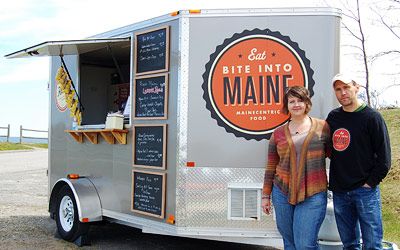Food-truck fans make a case for mobile dining
 Photo/Matt Dodge
Sarah and Karl Sutton run a lobster-centric food truck at Fort Williams in Cape Elizabeth
Photo/Matt Dodge
Sarah and Karl Sutton run a lobster-centric food truck at Fort Williams in Cape Elizabeth
When Sarah Sutton and her husband, Karl, decided they wanted to break into the food-truck business, they packed their bibs and headed for the Mecca of mobile cuisine that is Austin, Texas. "We spent a week there and we must have eaten at every food truck," recalls Sutton. "We thought, 'Why doesn't Portland have this?' It's such a foodie town."
Upon returning to Portland, the Suttons discovered that while there were city ordinances regulating food carts and ice cream trucks, there were no similar regulations on the books regarding food trucks, which are larger than carts and usually don't need to be towed. The couple eventually located their Bite Into Maine truck, which specializes in lobster rolls, at Cape Elizabeth's Fort Williams Park.
Meanwhile, a city task force continues to explore the logistics of allowing mobile restaurants on the city's streets. Prompted by an inquiry on the local restaurant directory blog, Portland Food Map, Creative Portland board member Andy Graham launched the task force. It's met four times to devise recommendations for a food truck ordinance, and plans to finalize those recommendations in the coming weeks.
Preliminary recommendations would allow food trucks to operate in any part of the city from 10 p.m. to 6 a.m. with the exception of residential zones. Prior to 10 p.m., food trucks would be allowed only on private property in certain parts of the city. They'd also have to be 65 feet from established restaurants, or 100 feet outside the downtown area. Trucks would be allowed in certain city parks including Deering and Compass as long as they apply with the city.
The recommendations also encourage a "cluster" model where food trucks would gather in one location, setting up something of a food court in private lots around the city.
While Graham says the group worked "surprisingly well" together in drafting its recommendations, there was an important voice missing from the group. "We didn't have anyone there who represented the eating public, this community of foodies that both pushed for this to happen and represents the primary benefactor," he says. The task force includes restaurateurs Steve DiMillo, Godfrey Wood (of Johnny Rockets in Portland and Freeport) and Doug Fuss (of Bull Feeney's) as well as food-cart operator Ron Gan and Maine Restaurant Association President and CEO Dick Grotton.
Grotton says food trucks still have the potential to have a negative impact of the Portland food scene. "It comes down to three issues; brick-and-mortars tend to hire a lot of people, food carts do not; they pay a lot of taxes, food carts do not; and it has been through the expertise and hard work of brick-and-mortar restaurants that Portland's foodie reputation has been something that is celebrated across the country, and I question whether this form of food distribution is going to add anything to the foodie discussions of Portland," says Grotton.
"Competition is great, but there is a concern that it's not equal competition," he adds.
Graham disagrees, saying that the city should be fostering innovation and entrepreneurship for all. "We don't restrict private enterprise when it's bricks and mortar, why should we do it when it's on wheels?"
Frank Gallagher, spokesperson for Otto Pizza, says he doesn't really view food trucks as a threat to the restaurant's two locations in Portland and delivery service.
"People who want Otto pizza want Otto pizza -- we've developed a very loyal customer base," he says. He says that food trucks could be a great addition to the local food scene, if done right. "It depends on what they are offering because people will try it one time, but unless they get something they really like, they won't be back," he says.
Matt Moran, owner of Nosh Kitchen Bar, says he is all for the idea of allowing food trucks in Portland, but that he doesn't think "food trucks will offer the same quality of food or fresh preparation people get [at Nosh]."
While Moran said Nosh will likely not branch out into the food truck market should the ordinance pass, he thinks the restaurant's sister establishment, Taco Escobarr, might make for the perfect food truck enterprise. "Taco trucks seem to make more sense to us," he says.
Having lived in Phoenix, a food-truck hot spot, Moran had some criticism regarding the proposed recommendations. "The [65-foot rule] is hard in this town; it's hard to be that far from a restaurant at any time."
He also cites a trend in the Phoenix market that he thinks could stimulate daytime business for Portland food trucks. "They would pull up behind an industrial park type of place and have people from 20 businesses come pouring out," says Moran.
For now, the Suttons are content to keep their 72-square-foot truck in Cape Elizabeth to sell their lobster rolls flavored with wasabi, chipotle and curry, along with traditional recipes. Last year they won the Best Lobster Roll award from the Portland Phoenix, beating out more traditional seafood establishments.
"It's a great model and a great way for entrepreneurs to start a business without the overhead of a traditional brick-and-mortar restaurant," says Sutton, a former Mainebiz employee.
Graham agrees. "I think that they can be a testing ground for different kinds of food that haven't found a place in the brick-and-mortar pantheon. I see this as a stepping stone to allow new chefs who aren't able to open a restaurant to test out their ideas and ideally grow them from food trucks into other venues," he says.
Read more









Comments